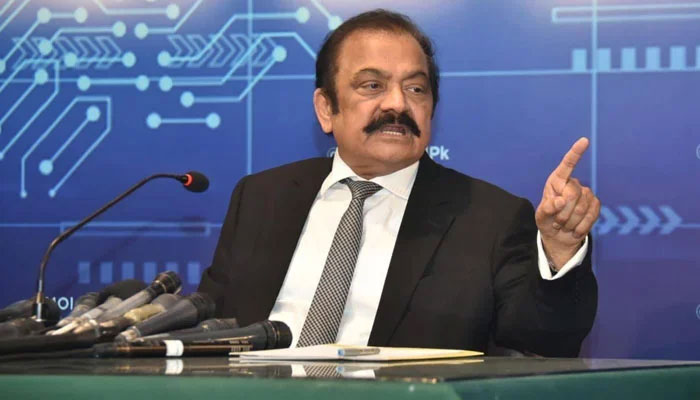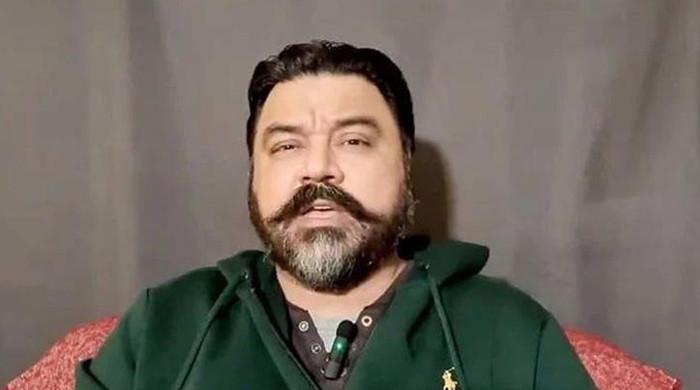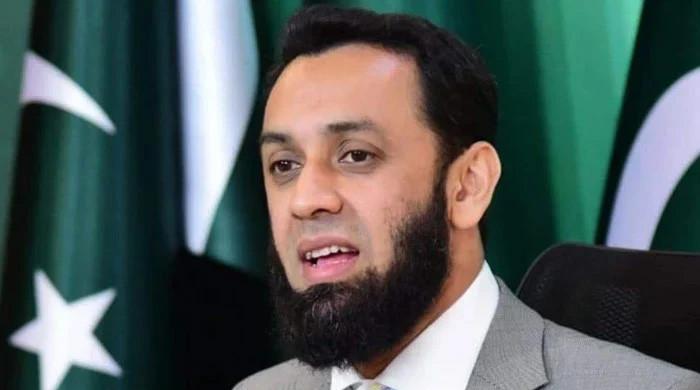Retired judge or bureaucrat shouldn’t be picked as caretaker PM: Sanaullah
Interior minister also says names like Ishaq Dar will naturally emerge if a politician is to be appointed as interim PM
July 26, 2023

- PML-N did not suggest Dar's name for slot of interim premier: minister.
- Says nothing wrong in Dar name if politician is to be named interim PM.
- Also rejects reports that PDM conspiring to delay general elections.
Interior Minister Rana Sanaullah has said that a politician should be appointed as caretaker prime minister as retired judges or bureaucrats are not “neutral” as well and set aside reports that Finance Minister Ishaq Dar was nominated by the ruling party for the coveted slot.
In an interview with a local TV channel on Wednesday, the security czar rejected reports that the ruling Pakistan Muslim League-Nawaz (PML-N) suggested the name of Dar for the slot of the interim premier.
However, the federal minister said if a politician is to be appointed as caretaker prime minister then there is nothing wrong in the name of Ishaq Dar.
“When not only my party but everyone is saying that only a politician should be appointed as caretaker prime minister and not any technocrat, retired bureaucrat or retired judge […] so naturally a name like this [Dar] would emerge for [caretaker PM],” he added.
Politicians, he said, from other parties can also be nominated for the slot of interim prime minister. “From the PPP, Raza Rabbani’s name can be picked,” he added.
Sanaullah's statement comes as mainstream media quoted the ruling insiders as saying that the Pakistan Muslim League-Nawaz (PML-N) — a major partner in the ruling alliance — has decided to pick Dar as the caretaker PM.
Following criticism that the finance minister's appointment as caretaker PM would raise questions over the neutrality of the interim setup, the PML-N leaders rejected the media reports.
Not only did political commentators criticise the suggestion, but the Pakistan Peoples Party (PPP) — a key ally of PML-N at the Centre — also expressed reservations over Dar’s nomination as caretaker PM.
Defence Minister Khawaja Asif also shot down speculations, saying that no one close to the top PML-N leadership — the Sharif family — would be nominated as the interim PM to ensure that fingers aren't pointed at the caretaker setup.
Earlier today, Dar said the talks for the coveted post are "premature" and consultations have not yet begun for the appointment.
During an interview on a private television channel on Tuesday, he said the Pakistan Democratic Movement's (PDM) leadership — the alliance ruling in the Centre — would decide on the appointment.
Elections Act amendments
Speaking about amendments to Election Act 2017, the interior minister said the legislation is only aimed at empowering the caretaker government to ensure the smooth functioning of the economy and other important matters.
He rejected the rumours that the incumbent coalition was planning to extend the stay of the caretaker government beyond 90 days.
Sanaullah further said all speculations in this regard are false as no conspiracy was being hatched to delay the elections.
Earlier today, a joint session of parliament approved amendments to Election Act 2017, granting additional powers to the caretaker government to take important decisions on the economy and engage with international institutions.
The bill titled "Elections (Amendment) Bill, 2023" approved with a majority vote fueled the speculations that the additional powers being granted to caretaker setup in a bid to enable the interim rulers to take important decisions related to the economy in the absence of elected government.
The sub clauses 1 and 2 of Section 230 of the election act related to the functioning of caretaker government have been amended.
Under the amendments, the interim setup will not have the authority to sign any new agreement and make decisions on bilateral and multilateral agreements.
The caretaker government will be able to exercise powers on matters related to the ongoing projects, according to the amendments.











